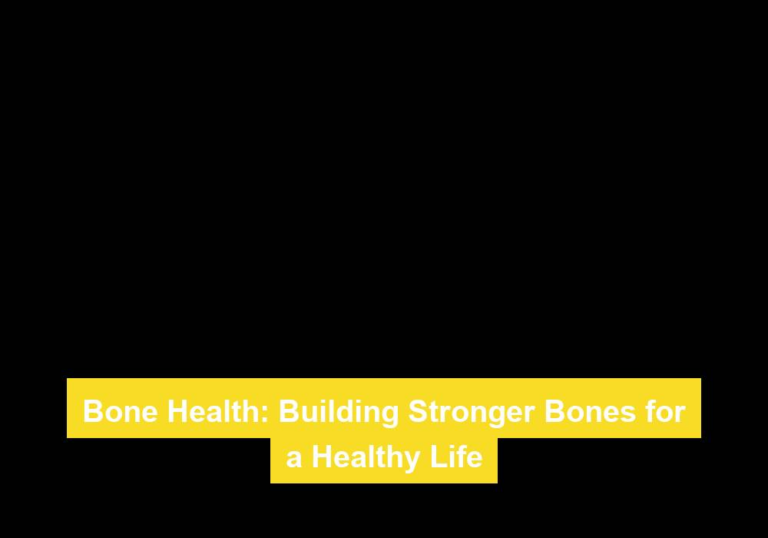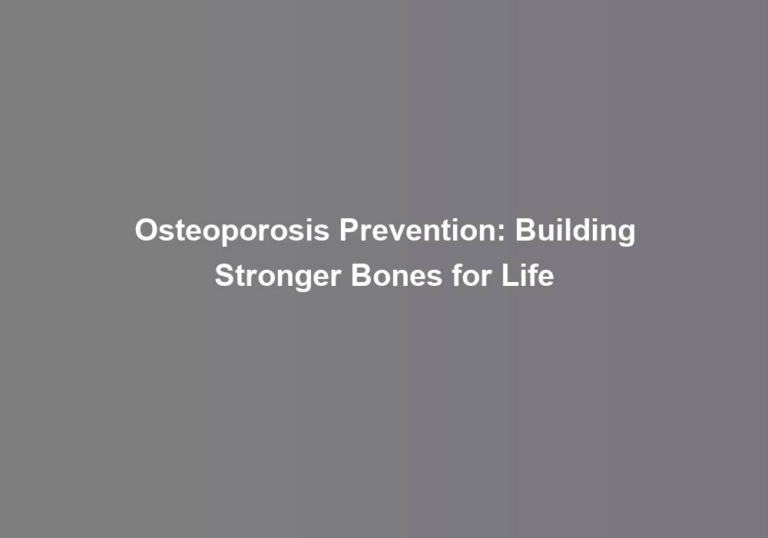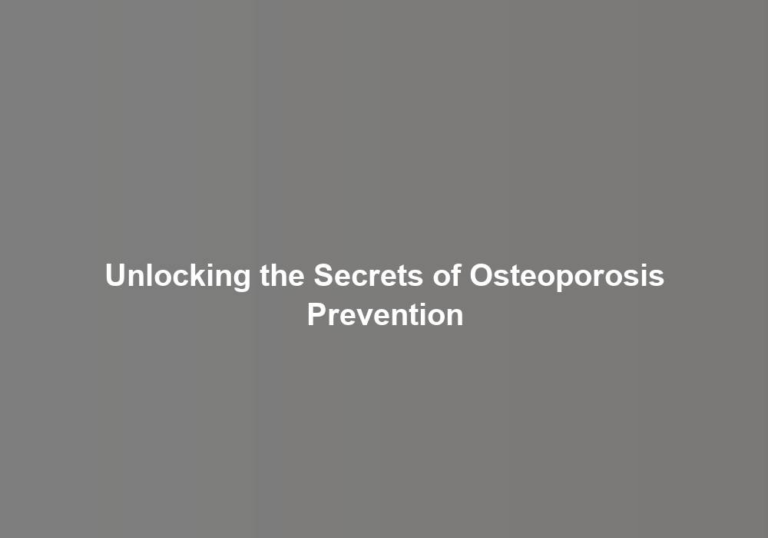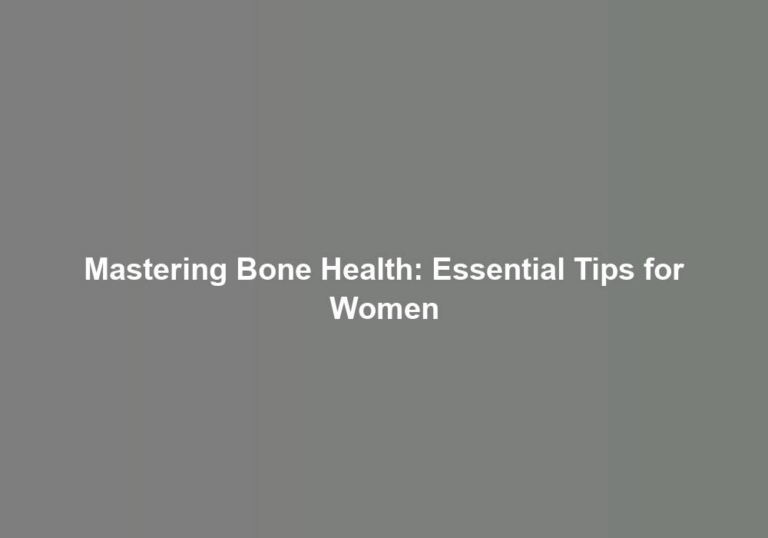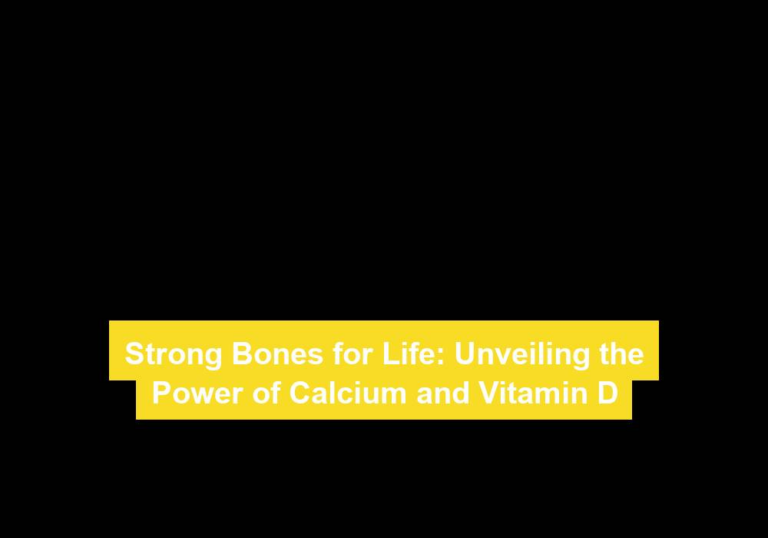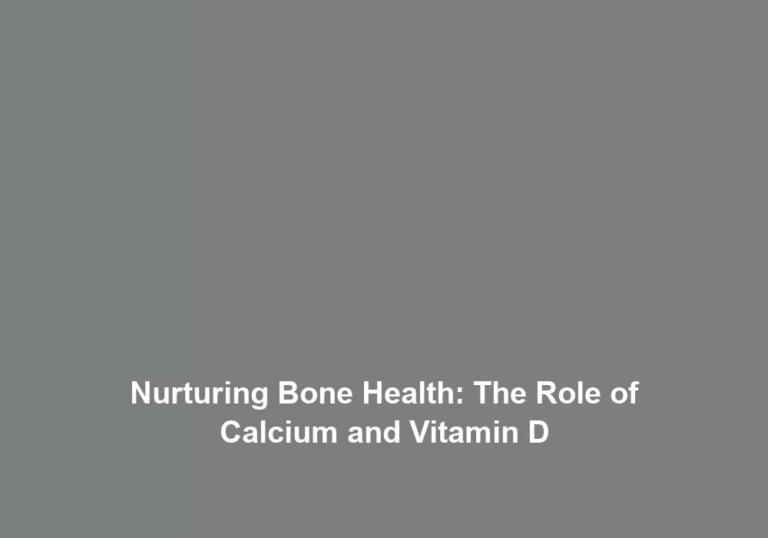Mastering Bone Health: The Role of Calcium and Vitamin D
If youG??ve ever thought about bone health, itG??s like building a sturdy foundation for a house; you want it to be strong and supportive. But how do you ensure that your bones are getting the support they need to remain strong and healthy? The answer lies in understanding the crucial role of calcium and vitamin D. As you explore the intricate interplay between these essential nutrients and bone health, youG??ll uncover the vital role they play in maintaining skeletal strength and integrity.
The Importance of Calcium
To maintain strong and healthy bones, you need to ensure that you are getting an adequate amount of calcium in your diet. Calcium is a crucial mineral that plays a vital role in maintaining bone health and density. Your body not only uses calcium for building and maintaining bones and teeth, but it also needs it for muscle function, nerve signaling, and hormonal secretion.
Calcium absorption is a complex process that is influenced by various factors. Vitamin D, for example, is essential for calcium absorption in the intestines. Without enough vitamin D, your body may struggle to absorb an adequate amount of calcium, even if you are consuming it in your diet. Additionally, certain foods and drinks, such as those high in oxalates or phytates, can inhibit calcium absorption. ItG??s important to consider these factors when planning your calcium intake.
Ensuring that you have sufficient calcium in your diet is crucial for maintaining bone density. Throughout your life, your body is constantly breaking down and rebuilding bone tissue. Adequate calcium intake helps to support this ongoing process, preventing bone density loss and reducing the risk of osteoporosis, a condition characterized by brittle and fragile bones.
Incorporating calcium-rich foods such as dairy products, leafy green vegetables, and fortified foods into your diet can help you meet your calcium needs. If necessary, supplements can also be used to ensure you are getting enough calcium to support your bone health. Remember, maintaining strong and healthy bones requires a conscious effort to prioritize your calcium intake.
Sources of Vitamin D
To ensure an adequate intake of Vitamin D, you can start by spending time in the sunlight, which is a natural source of this essential nutrient. Additionally, you can explore fortified food options such as milk, orange juice, and cereals to boost your Vitamin D levels. If necessary, consider incorporating dietary supplements to meet your recommended daily intake.
Sunlight as Source
Sunlight exposure is a primary source of vitamin D for your body. When your skin is exposed to sunlight, it produces vitamin D through a natural process. However, the amount of vitamin D synthesized depends on various factors such as the time of day, season, latitude, and skin pigmentation. HereG??s a breakdown of how sunlight exposure affects your bodyG??s vitamin D production:
| Factors | Impact |
|---|---|
| Sun exposure | Greater exposure leads to increased vitamin D synthesis |
| UV radiation | UVB rays are essential for initiating the process of vitamin D synthesis |
| Vitamin D synthesis | Occurs when UVB rays penetrate the skin and convert a cholesterol derivative into vitamin D |
| Skin pigmentation | Darker skin requires longer sun exposure to produce the same amount of vitamin D as lighter skin |
Understanding these factors can help you make informed decisions about sunlight exposure for optimal vitamin D levels.
Fortified Food Options
When seeking sources of vitamin D, consider incorporating fortified foods into your diet to help maintain optimal levels. Food fortification is a strategy used to add essential nutrients, such as vitamin D, to commonly consumed foods. Many fortified options, including milk, orange juice, and breakfast cereals, can contribute significantly to your daily vitamin D intake. These fortified foods can be a convenient way to ensure that you are meeting your nutrient requirements, especially if you have limited sun exposure. Additionally, pairing these fortified foods with sources of calcium can enhance nutrient absorption, supporting overall bone health. When selecting fortified products, be sure to check the nutrition labels for the amount of added vitamin D to make informed choices about your dietary intake.
Dietary Supplements
Consider that while fortified foods are valuable sources of vitamin D, dietary supplements also offer a reliable means of maintaining adequate levels of this essential nutrient. Vitamin D supplements are effective in helping individuals meet their daily requirements, especially for those who have limited sun exposure or specific dietary restrictions. When choosing a vitamin D supplement, ensure that it contains vitamin D3 (cholecalciferol), as this form is more effective at raising and maintaining vitamin D levels in the body compared to vitamin D2 (ergocalciferol). ItG??s important to note that excessive intake of vitamin D through supplements can lead to health risks, such as hypercalcemia (elevated calcium levels in the blood) and its associated complications. Therefore, itG??s crucial to follow recommended dosage guidelines and consult with a healthcare professional before starting any new supplement regimen.
Recommended Intake of Calcium
To maintain healthy bones, it is important to ensure you are meeting the recommended intake of calcium through your diet or supplements. Calcium plays a crucial role in bone health, as it is involved in essential processes such as calcium absorption and calcium metabolism. The recommended intake of calcium varies by age, gender, and other factors, but the general guidelines are as follows:
-
Age and Gender: The recommended daily intake of calcium for adults aged 19-50 is 1,000 mg for both men and women. Women over 50 and men over 70 should aim for 1,200 mg per day.
-
Pregnancy and Breastfeeding: During pregnancy and while breastfeeding, women under 19 require 1,300 mg of calcium per day, and those aged 19 and over need 1,000 mg daily.
-
Sources of Calcium: Incorporating dairy products like milk, yogurt, and cheese into your diet can help you meet your daily calcium requirements. Additionally, leafy green vegetables, fortified plant-based milk, and calcium-fortified foods are good sources of calcium for those who are lactose intolerant or follow a plant-based diet.
-
Supplements: If you are unable to meet your daily calcium needs through diet alone, calcium supplements can be beneficial. However, itG??s essential to consult with a healthcare professional before starting any new supplement regimen to ensure it is appropriate for your individual needs.
Meeting the recommended intake of calcium is vital for maintaining strong and healthy bones, and making informed dietary choices can help support overall bone health.
Impact on Bone Development
Ensuring you meet the recommended intake of calcium is essential for bone health, as it directly impacts bone development and strength. During childhood and adolescence, the body builds bone mass rapidly, reaching its peak bone mass by the late 20s. Adequate calcium intake during this period is crucial for maximizing bone density and strength, which can help reduce the risk of fractures and osteoporosis later in life.
As you age, the effects of inadequate calcium intake become more pronounced. When the body doesnG??t receive enough calcium from the diet, it starts to withdraw calcium from the bones, making them weaker and more susceptible to fractures. This gradual reduction in bone density is a natural part of the aging process, but it can be accelerated by factors such as poor nutrition, lack of physical activity, and hormonal changes.
Research has consistently shown that sufficient calcium intake, in combination with vitamin D and regular weight-bearing exercise, is essential for maintaining optimal bone health throughout life. By incorporating calcium-rich foods into your diet and, if necessary, using supplements, you can help preserve bone density and reduce the aging effects on your skeletal system.
Role of Vitamin D
You need to understand the essential role of Vitamin D in bone health. Vitamin D can be obtained through sunlight exposure, certain foods, and supplements. It plays a crucial role in calcium absorption, bone mineralization, and overall bone health.
Vitamin D Sources
Increasing your intake of foods rich in vitamin D, such as fatty fish and fortified dairy products, can play a crucial role in maintaining bone health. Additionally, vitamin D synthesis occurs in the skin when itG??s exposed to sunlight. Here are some practical ways to incorporate more vitamin D into your diet:
- Fatty fish: Salmon, mackerel, and tuna are excellent sources of vitamin D.
- Fortified dairy products: Milk, yogurt, and cheese fortified with vitamin D can boost your intake.
- Egg yolks: Including egg yolks in your diet can provide a natural source of vitamin D.
- Fortified cereals: Some cereals are fortified with vitamin D, making them a convenient option for breakfast.
Vitamin D Absorption
To optimize the absorption of vitamin D, it is essential to understand its role in the body and the factors that influence its effectiveness. Vitamin D absorption primarily occurs in the small intestine, where it is absorbed along with dietary fats. Therefore, consuming vitamin D with a source of healthy fats can aid in its absorption. Additionally, the bodyG??s ability to absorb vitamin D decreases with age, making it important to ensure adequate intake. Exposure to sunlight also plays a crucial role in improving absorption, as UVB rays convert a form of cholesterol in the skin into vitamin D. Monitoring and maintaining optimal levels of vitamin D in the body is essential for overall health, as it contributes to bone strength, immune function, and various other vital processes.
Vitamin D Deficiency
Vitamin D plays a crucial role in maintaining overall bone health and regulating calcium levels in the body. Preventing deficiency is essential, as vitamin D deficiency can lead to health implications such as weakened bones, increased risk of fractures, and compromised immune function. Here are some practical steps to prevent deficiency:
- Spend time outdoors: Getting regular sun exposure helps your body produce vitamin D.
- Consume vitamin D-rich foods: Include fatty fish, egg yolks, and fortified dairy products in your diet.
- Consider supplements: If you have limited sun exposure or dietary restrictions, talk to your healthcare provider about vitamin D supplements.
- Get regular check-ups: Periodic blood tests can help monitor your vitamin D levels and guide appropriate interventions.
Taking these steps can help ensure that you maintain optimal vitamin D levels, supporting overall bone health and well-being.
Maintaining Skeletal Health
In order to maintain your skeletal health, it is essential to incorporate a balanced diet rich in calcium and vitamin D, engage in weight-bearing exercises, and avoid smoking and excessive alcohol consumption. These habits play a crucial role in supporting bone density and overall skeletal strength. Weight-bearing exercises, such as walking, running, and resistance training, help stimulate bone formation and prevent bone loss. Additionally, they improve muscle strength, coordination, and balance, reducing the risk of falls and fractures. Furthermore, hormonal regulation, particularly through adequate vitamin D levels, is vital for calcium absorption and bone mineralization.
To provide a clear visual representation of the recommended dietary sources of calcium and vitamin D, here is a table outlining some examples:
| Calcium-Rich Foods | Vitamin D Sources |
|---|---|
| Dairy products (milk, yogurt, cheese) | Fatty fish (salmon, mackerel) |
| Leafy greens (kale, spinach) | Fortified foods (cereals, orange juice) |
| Tofu | Egg yolks |
| Almonds | Cheese |
| Sesame seeds | Cod liver oil |
Conclusion
So, keep your bones strong and healthy by making sure you get enough calcium and vitamin D every day. Just like a sturdy foundation supports a building, these nutrients support your skeletal structure, keeping you standing tall and strong. DonG??t overlook the importance of bone health – itG??s the backbone of your overall well-being. Take care of your bones, and theyG??ll take care of you.


